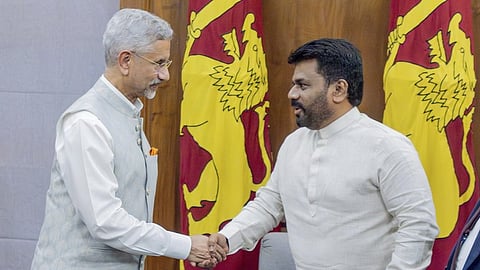

Anura Kumara Dissanayake, Sri Lanka's newly elected president, is visiting New Delhi for the second time in just 10 months. Yet there is a big difference this time around.
Ten months ago when a National People's Power (NPP) delegation led by Dissanayake visited India's capital, it was a time of great possibilities for him and his political clan, though nothing was certain. Not even a date was fixed for an election in the island nation. But Delhi was keenly aware of Sri Lanka's changing political landscape and the possibility of Dissanayake becoming the island's next president, whenever an election was called.
Call it prudent or timely, Delhi's first invitation then was a calculated gamble. The time was correct to meet the 55-year-old Marxist leader who most Sri Lankans began to identify as the one to be trusted. He was, however, leading a political party that carries deep-rooted anti-India sentiments in its genes.
The visit that now follows on December 15 has the added significance of being his first international visit as the island's new president. Dissanayake will hold bilateral discussions with Indian Prime Minister Narendra Modi and President Droupadi Murmu. The Sri Lankan President will be accompanied by Foreign Minister Vijitha Herath and Deputy Finance Minister Anil Jayantha Fernando.
In recent years, India has made significant investments in Sri Lanka's infrastructure and will be keen to strengthen commercial linkages with Colombo, despite China's role as the island's highest bilateral lender.
It is also not lost on Delhi that the left-leaning president will walk the tightrope and resist being dragged into any India-China rivalry. It's a position Dissanayake has often reiterated, while stressing on the NPP's openness to deal with Beijing and China without choosing one over the other.
Undoubtedly, Delhi will play gracious host and try not to ruffle feathers with a government that is still settling in. India has been unhappy about the new government's lack of engagement since September but the president's first foreign visit being made to Delhi is a sign of the NPP's prudence and indicates an intention to forge better relations.
The new administration acknowledges India's role in Sri Lanka's economic recovery, first through a $4-billion loan and humanitarian support after the 2022 economic collapse, and the supportive role towards inking a bailout with the International Monetary Fund (IMF) to rebuild the economy.
Dissanayake has acknowledged India's geostrategic interests in Sri Lanka and has shown an interest in working around issues rather than getting confrontational.
The bilateral agenda is likely to include areas that are contentious, given that Dissanayake himself has publicly opposed some of them in his opposition days, including the pending Economic and Technology Cooperation Agreement (ETCA), construction of a land corridor between the nations, developing the Trincomalee harbour as a regional energy hub, a much-discussed free trade agreement and the elephant in the room, the Gautam Adani projects.
This time, it will call for much sober consideration of each agenda item by President Dissanayake. India is Sri Lanka's third biggest bilateral lender, after China and Japan, a reality Colombo needs to tackle.
The JVP-led NPP has had five decades of politics. The JVP has led two youth rebellions in the South and mounted opposition against several Indian interventions, particularly in the 1987-1989 period, when the India-Sri Lanka peace accord was signed, resulting in the mobilisation of Indian boots on Sri Lankan soil, which the JVP had staunchly opposed with repeated demands to withdraw Indian peacekeepers.
Likewise, the JVP remains to date a staunch opponent of the 13th Amendment to the Constitution, which the party states was done only at the behest of India. The JVP has rejected the provincial council system, also an outcome of the said constitutional amendment, terming it a "white elephant" and a move to pave the way for federalism.
As much as the commercial linkages are going to prove contentious, perhaps it would be the question of power devolution under the 13th Amendment that would prove the hardest – as it goes to the very core of the JVP-led second insurgency, a blood-stained chapter in Sri Lankan politics.
Delhi will do well to take into consideration the new Tamil political dynamics that places the NPP administration in a far more legitimate position than ever before to discuss the Tamil question and devolution of power.
Despite its status as a majoritarian political outfit, the November electoral results have shown that in the North and in large parts of the East, Tamil voters have opted for the JVP/NPP. Ahead of elections, carefully considered pledges have been made on returning lands and the release of Tamil political prisoners. Promises have been made to develop the former conflict zones and to move investments into regions that were once the hotbed of conflict.
This places the new administration in a stronger position, creating greater possibilities of offering a homegrown solution to the political question rather than one that’s historically supervised by India. There is every possibility that, beyond the conducting of the promised provincial council elections, Dissanayake will leverage the government’s supermajority to charter a new course.
It would be interesting indeed to see Delhi welcome Sri Lanka's new head of state, a politician whose career was largely built on an anti-India sentiment, and then to be given a guard of honour by a military force he once wanted to quit Sri Lanka. History has come full circle.